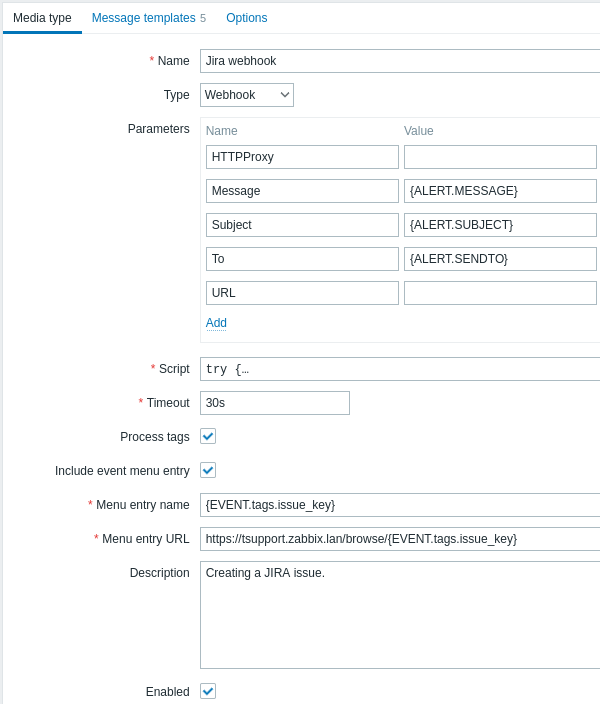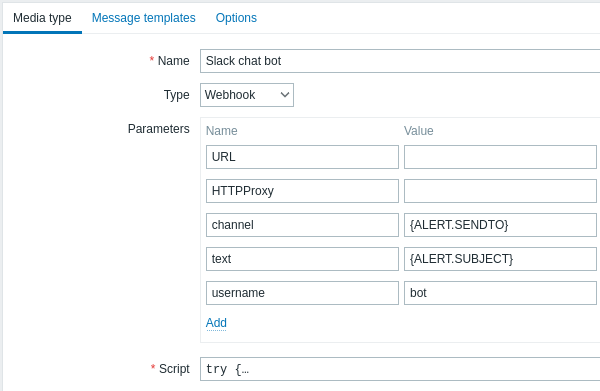This is the documentation page for an unsupported version of Zabbix.
Is this not what you were looking for? Switch to the current version or choose one from the drop-down menu.
Is this not what you were looking for? Switch to the current version or choose one from the drop-down menu.
Table of Contents
Webhook script examples
Overview
Though Zabbix offers a large number of webhook integrations available out-of-the-box, you may want to create your own webhooks instead. This section provides examples of custom webhook scripts (used in the Script parameter). See webhook section for description of other webhook parameters.
Jira webhook (custom)

This script will create a JIRA issue and return some info on the created issue.
try {
Zabbix.log(4, '[ Jira webhook ] Started with params: ' + value);
var result = {
'tags': {
'endpoint': 'jira'
}
},
params = JSON.parse(value),
req = new HttpRequest(),
fields = {},
resp;
if (params.HTTPProxy) {
req.setProxy(params.HTTPProxy);
}
req.addHeader('Content-Type: application/json');
req.addHeader('Authorization: Basic ' + params.authentication);
fields.summary = params.summary;
fields.description = params.description;
fields.project = {key: params.project_key};
fields.issuetype = {id: params.issue_id};
resp = req.post('https://tsupport.zabbix.lan/rest/api/2/issue/',
JSON.stringify({"fields": fields})
);
if (req.getStatus() != 201) {
throw 'Response code: ' + req.getStatus();
}
resp = JSON.parse(resp);
result.tags.issue_id = resp.id;
result.tags.issue_key = resp.key;
return JSON.stringify(result);
}
catch (error) {
Zabbix.log(4, '[ Jira webhook ] Issue creation failed json : ' + JSON.stringify({"fields": fields}));
Zabbix.log(3, '[ Jira webhook ] issue creation failed : ' + error);
throw 'Failed with error: ' + error;
}Slack webhook (custom)
This webhook will forward notifications from Zabbix to a Slack channel.

try {
var params = JSON.parse(value),
req = new HttpRequest(),
response;
if (params.HTTPProxy) {
req.setProxy(params.HTTPProxy);
}
req.addHeader('Content-Type: application/x-www-form-urlencoded');
Zabbix.log(4, '[ Slack webhook ] Webhook request with value=' + value);
response = req.post(params.hook_url, 'payload=' + encodeURIComponent(value));
Zabbix.log(4, '[ Slack webhook ] Responded with code: ' + req.getStatus() + '. Response: ' + response);
try {
response = JSON.parse(response);
}
catch (error) {
if (req.getStatus() < 200 || req.getStatus() >= 300) {
throw 'Request failed with status code ' + req.getStatus();
}
else {
throw 'Request success, but response parsing failed.';
}
}
if (req.getStatus() !== 200 || !response.ok || response.ok === 'false') {
throw response.error;
}
return 'OK';
}
catch (error) {
Zabbix.log(3, '[ Slack webhook ] Sending failed. Error: ' + error);
throw 'Failed with error: ' + error;
}© 2001-2025 by Zabbix SIA. All rights reserved.
Except where otherwise noted, Zabbix Documentation is licensed under the following license
